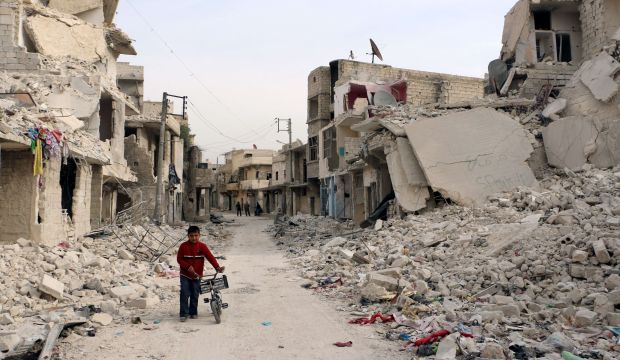
A Syrian boy walks with his bicycle in the devastated Sukari district in the northern city of Aleppo on November 13, 2014.
(AFP Photo/Baraa Al-Halabi)
“Syrians will be given work permits in a coherent manner so that no harm is inflicted on the local system in Turkey. And wages will not be less than the minimum rates given to citizens,” Çelik said during a budget meeting in the Turkish parliament. Syrians taking refuge in Turkey will be given the right to work in the sectors that suffer a shortage in manpower, he added.
In other news, the prime minister of the Syrian opposition’s interim government, Ahmed Tu’mah, met Turkish Prime Minister Ahmet Davutoğlu on Wednesday as part of his efforts to secure financial and political support.
Tu’mah told Asharq Al-Awsat he had informed Davutoğlu that establishing a safe zone along the border with Turkey is “a strategic demand for [the Syrian opposition] and for Turkey, and could be the first step in the direction of reaching an integrated political solution [in Syria].”
“The international community thinks in terms of partial rather than complete solutions to the situation in Syria but we, alongside Turkey, are working towards reaching a comprehensive one,” he added.
Tu’mah said the Syrian opposition is “working strenuously to unite military [opposition] forces.”
The head of the Western-backed Syrian opposition government said he is going to present a new cabinet line-up to the Syrian National Coalition, Syria’s umbrella opposition group, during its forthcoming meeting. He described the talks on forming a new interim government that have been held so far as “positive.”
“We are working towards forming a national unity government in cooperation and consultation with the Coalition’s leadership,” he said, maintaining that the new government “will have a positive impact in terms of unifying the work of the Coalition.”
He also urged the international community to provide support for all armed opposition groups “without discrimination, including the Islamist ones that have recently signed an honor code.”
Throughout the conflict in Syria, the Coalition has struggled to exert influence over the large number of fractious groups that make up the armed opposition within Syria itself. It has also been beset by both internal feuds and rivalries between ‘moderate’ armed groups and Islamist groups, many of which have ties to Al-Nusra Front and the Islamic State of Iraq and Syria (ISIS), which are in turn outgrowths of Al-Qaeda.
While the US has promised to provide training and arms to moderate opposition groups affiliated with the Coalition, they have been steadily losing ground to their more radical opponents within the ranks of the opposition. Earlier this month, Al-Nusra Front overran bases belonging to moderate Western-backed rebel groups in the province of Idlib in northern Syria.
Meanwhile, UN’s Special Envoy for Syria Staffan di Mistura is finalizing the details of his plan to end hostilities in Syria’s northern city of Aleppo, spokesperson Juliette Tuma told Asharq Al-Awsat.
“Over the next two weeks we will be working to formulate the technical side of the plan and ways of implementation,” she said.
The city of Aleppo, previously Syria’s commercial capital, is one of the few remaining strongholds of the Syrian opposition, and has been the scene of intense fighting between government forces and opposition fighters which have left much of it in ruins.
While the Syrian government and opposition have both welcomed the plan, many questions remain unanswered as to how it will be implemented.
The opposition, in particular, has accused the Syrian government of using previous ceasefires to round up suspected opponents in contested areas.
